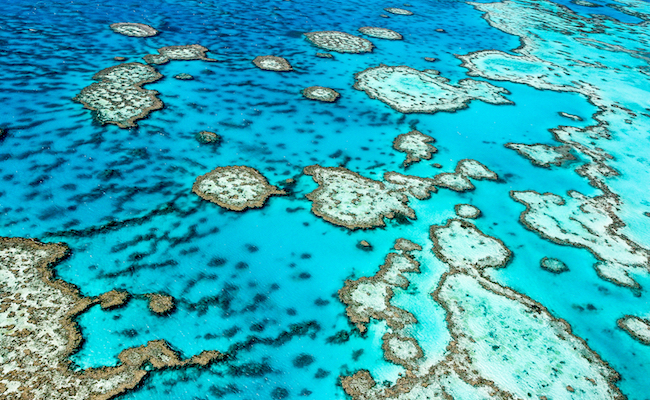
Some days, it’d be nice to imagine that global warming, climate change, and the destruction of our environment were all just conspiracy theories created to keep us from real issues. Today is definitely one of those days. But unfortunately, science has the proof to wake us up: 1) massive sections of the Great Barrier Reef are dying and 2) it’s due to humans. Coral is fighting for its very survival as water temperatures rise (human impact on certain sections of the reef isn’t helping matters). On Monday, the World Wildlife Fund released footage showing that the coral in parts of The Great Barrier Reef had been bleached, making it clear that if something isn’t done (and quickly) the delicate coral reef ecosystem may be damaged beyond repair.
This has led the Great Barrier Reef Marine Park Authority to raise its response level as high as it would go (“11!”).
“The corals in the remote far north of the reef experienced extremely hot and still conditions this summer, and were effectively bathed in warm water for months, creating heat stress that they could no longer cope with,” Russell Reichelt, the chairman of the Great Barrier Reef Marine Park Authority, said in a statement:
Bleaching occurs when warm ocean water stresses corals to the point that they expel the tiny algae, known as zooxanthellae, that normally live inside their tissues. The algae provide the corals with most of their food, as well as their color. If the heat stress is lessened soon enough, the coral can recover. If not the, organisms will die.
Vice reports that February was the hottest month in global history (terrifying), so it’s not surprising that there’s some damage to the Great Barrier Reef, but no one expected the level of devastation that’s been discovered. The water temperature has gotten so hot that coral is being cooked, leading to stress, and loss of color, which can lead to greater deleterious effects in the ocean.
But it’s more than just the temperature rising that is causing the coral stress. It’s also ocean acidification, National Geographic reports:
As the concentration of carbon dioxide in the atmosphere rises due to emissions of fossil fuels, more of the gas is dissolving in the ocean. That is lowering the pH of the water, or making it more acidic, which can make it harder for reef-building organisms to construct their hard skeletons.
While some may not view coral bleaching as particularly serious, it’s important to note that the U.N. has listed it as “the most widespread and conspicuous impact of climate change.” The continued bleaching will not only “damage reef-based fisheries” and make the coastlines more exposed to “waves and storms” it may damage the tourism economy in places like Australia and Hawaii, where seeing coral up close and personal is big business. Also, f*ck, if we can’t even keep coral alive, we’re in trouble.
Is there still time to do something? At the moment, yes, but it’s going to take a lot of coordination and participation from more than just the governing bodies which oversee the safety of the coral. Unless we can work together to slow climate change, more and more coral may disappear forever, leading to levels of ocean devastation we haven’t yet even considered.






